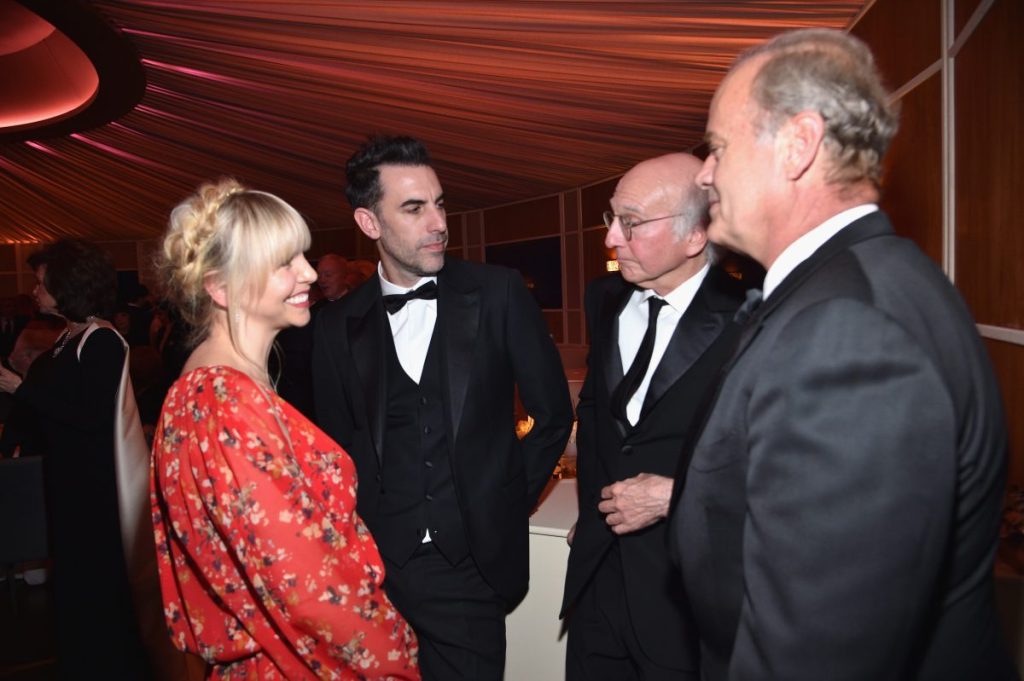A version of this post originally appeared on Tedium, a twice-weekly newsletter that hunts for the end of the long tail.
Not too long ago, I drove by a radio station with an apostrophe in its call sign. Reading it aloud, it seemed the apostrophe affected an actual word, but my inner Star Trek fan immediately decided it simply must be a Klingon radio station.
Videos by VICE
Sadly, it was just a country station, but the experience prompted a silly thought: what if there were an actual Klingon radio station? Surely some dedicated Trekkers around the world may have done the same thing with the Klingon language that some enterprising (get it?) Star Trek fans did with folk music decades before.
The world is a bit bleak at the moment, so we decided to get a little nerdy this week and dive into an entirely new frontier. So grab a bowl of your favorite Klingon cuisine and a barrel of blood wine, because we’re exploring something a bit different: the Klingon language and its interesting impact on modern pop culture.
1985
The year in which The Klingon Dictionary saw its initial publication. The book includes grammar, vocabulary, and a vital pronunciation guide for the language. The book did not, however, provide any exercises or practice guides for actually learning the language. This likely decreased its efficacy for actually learning the language, but it was probably intended more as a guide for actors and a fun collectible for Trek fans than anything else. The book inspired at least one current Internet Archive user to create a HyperCard stack to help them learn the language in convenient electronic form. A second edition saw publication in 1992.
How a professional linguist transformed some gibberish into a constructed language
Like any story worth telling, the history of the Klingon language begins with improvisation. Some reports—including the DVD commentary for Star Trek: The Motion Picture Director’s Cut—maintain the genesis of the language rests with James Doohan (who played Montgomery “Scotty” Scott on the original show) and the film’s associate producer Jon Povill. The two had a meeting where they established a few basic words the aliens would utter throughout the movie. Doohan recorded the words for veteran Trek actor Mark Lenard, who portrayed a Klingon captain in the film. Lenard transcribed the words phonetically and practiced them to nail the delivery of his lines in the film. Doohan and Povill didn’t develop the language further. That honorable duty befell another man who wouldn’t enter the picture until Wrath of Khan’s editing phase.
Enter legendary linguist Marc Okrand, the creator of the Klingon language. Okrand began his career teaching linguistics courses in Santa Barbara, CA. Following his stint as a university teacher, he joined the Smithsonian Institute for a while researching California Native American languages that hadn’t been spoken for a long time. Following that, he began to work with The National Captioning Institute on developing closed captioning for educational purposes and the hearing impaired (look for a future issue of Tedium on the subject). In the midst of a fruitful career, Okrand stumbled almost accidentally into working on Star Trek through his captioning work.
Though it didn’t make its debut until the third Trek film, the genesis of the Klingon language in its current form actually lies with The Wrath of Kahn. In that film, there were two Vulcan characters speaking to each other in a corridor. The producers shot the scene with the actors speaking English but later decided to change it to the Vulcan language. The trouble was, a Vulcan language didn’t exist. Unbeknownst to anyone at the time, Marc Okrand would soon become the hero the film didn’t realize it needed.
Okrand believes luck played a significant role in gaining the opportunity in the first place. He was only in California for one week but had nothing to do for three days. He had two friends making Star Trek who wanted his opinion about expanding the alien languages within the film. It turned out to be a major headache for the film’s producers and they needed to resolve it within the week—the same week in which Okrand was visiting the state.
In 2018, Okrand told The Washington Post how he became involved in bringing alien languages to the franchise:
My real job, the one that really paid the bills, was closed captioning. The first program we did live was the Oscars, 1982. They flew me out to L.A., and I was having lunch with a friend who worked at Paramount. She and I go out to lunch, and the fact that I was a linguist came up—I have a PhD in linguistics. They wanted a linguist to come and make up gobbledygook that matches the lip movements. And I said, “I can do that!”
He only received a few hundred dollars for his work, but he delighted in his experience teaching Mr. Spock how to speak Vulcan. But following the success of the second film, something unexpected happened: Okrand received a call from Harve Bennett—the writer/producer of Star Trek III: The Search for Spock—asking him to create a full language for the Klingons to use in the film. As he told interviewer EC Henry in 2016, “every once in a while in life, you’re presented with a decision that’s really easy to make. That was one of those!”
The Search for Spock and most subsequent Star Trek programs featured Okrand’s language in some form, including the most recent Trek films up to Star Trek Into Darkness. He was still involved in Star Trek Beyond, too, creating several different languages for that film.
petaQ
The most common Klingon curse word. In the spirit of Nicolas Cage’s new Netflix show, we simply had to include this one. Usually written as P’Takh—Klingons sure do love their apostrophes—it’s always used as a noun in the show to insult other characters. It’s pronounced more like “pet-ock” with an extremely harsh guttural sound at the end. According to the Klingon Language Institute, the root of the word is “taQ” meaning “to be weird,” or indicating some kind of strangeness. But it’s more likely that it’s merely a common, interchangeable insult or as Enterprise suggests, it means “enemy.” A good runner up is probably “Qapla/Q’Plah”—the Klingon equivalent of “Have a Nice Day.” Imagine that on a bumper sticker or a T-shirt.

The language eventually grew much larger than the property for which it was developed
It may be difficult to believe, but per the Guinness Book of World Records, Klingon is the most widely spoken fictional language in the world. It even has an entire, well-known institute dedicated to learning Klingon.
The language itself is harsh, guttural, and bears some resemblance to a mix of Yiddish, some Native American languages, and German. Anytime Okrand approached sounding similar to any of real language, he adjusted the Klingon words to differentiate them from sounding like real-life language, resulting in some of the very unique words one hears in Klingon.
What differentiates Klingon from other constructed languages—like J.R.R. Tolkien’s Elvish languages or some of the constructed languages in Game of Thrones—is the piecemeal nature of the language’s construction. Okrand designed the language as needed, based on the needs of the episodes and films for which he was consulted. It didn’t see further realization or development until much later.
The Klingon Dictionary took the idea to another level entirely, even if it didn’t fully function as a learner’s guide to the language. The book’s success led to other publications like the audiobooks Conversational Klingon and Power Klingon. 1997 brought the long-anticipated follow-up to the dictionary, Klingon for the Galactic Traveler. There’s even an interactive CD-ROM Star Trek: Klingon, whose third disc features a Klingon language lab.
There haven’t been any additional Klingon language books or multimedia since, but a group of speakers formed The Klingon Language Institute in 1992 to further the learning and development of the language over time. The Pennsylvania-based institute isn’t a loose organization of Trek enthusiasts; it’s a full non-profit organization dedicated to legitimately teaching Klingon through lessons, translators, and other online resources. They even offer a Klingon Language Certification Program.
Before going fully electronic, KLI published a quarterly journal, poetry, and fiction in the language and at one time even offered a $500 scholarship. It’s founder, Lawrence M. Schoen, is an accomplished speaker who currently acts as the institute’s director. KLI’s members still meet up once a year to lecture, teach, learn and discuss the language—all while having a good time, of course. Per KLI, only a few people are fluent enough in Klingon to actually speak it conversationally.
Okrand maintains a positive attitude and relationship with speakers of the language, but as he told Henry back in 2016, he “doesn’t speak it very well” because of the way he made it up in the first place. The language was built to one line at a time to suit the story of the show. He’d coach actors to say the lines, get through the process, and move on. Then he forgot some of it, so writing the book required more effort on his part to not only flesh out the language but almost rebuild it from some of his previous work on Trek.
In several interviews, Okrand is clearly proud of his work, but would definitely do it a bit differently if given the opportunity. He would have thought more about the structure and design of the language rather than simply creating words on the fly and revising them later. Despite the movie-prop nature of its construction, Klingon managed to evolve.
Okrand is still involved in the language as it continues developing, and people still ask him about creating new words to grow the language. At this point, Klingon is a developing constructed language that’s cemented its place in society outside of Star Trek. Okrand realizes it’s much larger than he ever intended, telling a convention in 2016 about the future of the language:
“At some point, it’ll grow without me, and that’s fine.”
“When I wrote the dictionary, I thought people would put it on their coffee table and reference it for fun, but a few years later, I found out they were dissecting and analyzing it. And thanks to the Internet, people were meeting on message boards to talk in Klingon.”
— Marc Okrand, the creator of the Klingon language. In a 2013 interview with Mashable, he marveled at how far the language he built for the Star Trek movies took off in real-life. While Okrand still referenced the dictionary while working the films at that time, he still asserts many other people speak the language much better than he does.

Dedicated speakers and technology helped the Klingon language transcend pop culture
Klingon was still going strong as the internet developed into its present form. Per Okrand, the rise of forums and internet chat actually may have helped breathe further life into the language. It’s obvious that Trek fans love it, but what’s most interesting about the language is how common it is among non-Star Trek fans. For instance, linguists and language enthusiasts love studying it or teaching it to family, like the PhD candidate who taught his young son Klingon to better understand the language. The man, D’Armond Speers, became academically interested in the language after seeing a flyer for the KLI.
That isn’t to say there aren’t plenty of fans who enjoy using the language and taking it to the higher levels. Capitalizing on the new age of smartphones, Simon & Schuster released The Klingon dictionary and language suite (containing the dictionary, Conversational Klingon, and other digital tools) for iPhone around 2009. Running from $3.99 to $11.99, iPhone users could learn Klingon in digital style.
Nowadays, DuoLingo and Youtube offer several ways to learn Klingon, from visual lessons to interactive studying.
On the pop culture front, some students of the Klingon language decided to translate Hamlet into the language to astonishing success. There was an insane Pizza Hut commercial spoken (and written!) entirely in Klingon. And you know something is truly popular when Rhett & Link feature it on Good Mythical Morning. And if you’re looking to groove to some Klingon-inspired tunes, you can’t go wrong with Klingon Pop Warrior or Stovokor.
I never found a good example of a Klingon radio station (aside from a long defunct fake station called, appropriately, KPLA radio), but Klingon opera is alive and well in the modern day.
One of the frequently recurring aspects of Worf’s character in Star Trek: Deep Space Nine is his love of Klingon Opera. Have you ever wondered what if Klingon Opera’s were a thing? As it turns out, a legitimate opera entitled ‘U’ was written and performed in Klingon. The U stands for “Universal.”
It was essentially a song in the key of Kahless, telling the story of the Klingon leader. Composed by Eef van Breen with a libretto by Kees Ligtelijn and Marc Okrand, the opera debuted in the Netherlands in 2010 to an enthusiastic audience reaction. Floris Schönfeld handled the artistic direction. It played a few more dates in 2012, but hasn’t been seen since. Don’t despair, though, as there may be a new Klingon Opera in the works.
Outside such creative endeavors, there seems to be a resurgence of the language in popular shows like the eternally annoying The Big Bang Theory. With the sole exception of the Barenaked Ladies’ theme song, I simply don’t enjoy The Big Bang Theory. While Star Trek references—including several instances of conversationally using the Klingon language—litter the show, it’s just not my cup of tea (I prefer chilled Earl Gray). It is, however, notable for bringing Klingon Boggle and The Klingon Dictionary back into the collective pop culture mind. If there’s one thing I dislike more than watching The Big Bang Theory, it’s probably playing a game of Monopoly. Yes, I am aware the game was joked about in the show before it came out. Per Memory Alpha, this may have been intentional product placement on the part of Hasbro. Either way, the real-estate trading game traces its origins back to the early 1900s and has its own unique history, but this astonishing board game has the distinction of merging Klingon and a popular board game, effectively bringing the language further into public consciousness.
And I thought real-life Klingon operas were weird.
“Speaking Klingon is a great way to make new friends.”
— Michael Dorn, the actor who played Lieutenant Commander Worf in Star Trek: the Next Generation and Star Trek: Deep Space Nine, during an ad for Rosetta Stone: Klingon. Dorn goes on to discuss how fun the language can be, with plenty of enthusiastic participants demonstrating their language skills. Of course, this was simply an April Fool’s joke perpetrated by ThinkGeek in 2014, but it’s a great piece of Klingon language history nonetheless.
As time and technology evolve, it truly seems as if the Klingon language will continue to capture the hearts and minds of both Trek fans and non-Trek fans alike. One doesn’t need to be a fan to learn and enjoy the language. All you need is an interest and the resources to learn.
It overcame a legal battle over copyright of the language in 2016 and may even be useful for treating dyslexia. Not bad for a constructed language designed for aliens in a Star Trek movie.
Marc Okrand’s work in closed captioning is legendary, but he left an indelible mark on both linguistics and pop culture for a long time to come. You don’t have to be a sci-fi fan to appreciate Klingon.
So until next time, stay safe, be kind to each other, and don’t forget to always say Q’Plah!
More
From VICE
-

Dr. Jingmai O'Connor/Field Museum -

Photo Credit: Starbucks -

Actors Kayte Walsh, Sacha Baron Cohen, Larry David and Kelsey Grammer presumably not discussing the need for 'Curb' to move (Photo by Kevin Mazur/VF17/WireImage) -

Things weren't always great for Tim Allen (Photo by Kypros/Getty Images)
